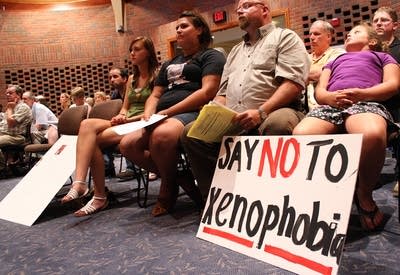Lino Lakes approves English-only resolution
Go Deeper.
Create an account or log in to save stories.
Like this?
Thanks for liking this story! We have added it to a list of your favorite stories.

The northern Twin Cities suburb of Lino Lakes has become the first Minnesota city to adopt English as its official language.
The city council Monday night approved a controversial measure barring the local government from translating official city actions and documents into other languages.
Council members called the resolution a common-sense budget matter, but it may have come at a cost.
Before the public comment period began, speakers who lined up for the podium were advised to keep their comments civil and brief, but emotions soon spilled over.
Turn Up Your Support
MPR News helps you turn down the noise and build shared understanding. Turn up your support for this public resource and keep trusted journalism accessible to all.
"You all scare me. It's like Nazi Germany. I'm scared, really," said Dora Salazar-Rolfzen addressing the council.
Salazar-Rolfzen asked the council if she would be arrested if caught speaking Spanish to her children. She had several outbursts during the night and was eventually escorted out by police.
To be clear, the resolution isn't an outright ban on foreign languages. City employees, as well as members of the public, are still allowed to speak in other languages. But it does bar Lino Lakes from spending public dollars on the translation of meetings and materials -- unless they deal with public safety, public health, and a host of other exceptions.
Many of last night's public comments veered into broader questions about racism, immigrants and assimilation.

Resident Carl Elmquist, the grandson of Swedish immigrants, told the council he feels like he's watching his country go down the drain.
"I'm tired of going to restaurants, and I hear all the new families not speaking English," Elmquist said. "They speak whatever their native tongue is to their kid, and it doesn't seem to be any teaching of the young kids in their family any English."
But Nancy Schardin, who works at an elementary school in the Anoka-Hennepin school district, said she's watched the English skills of her students take flight soon after they arrive in this country. And just as it was many generations ago, she said the parents are often the ones struggling.
"They can learn, and they will learn. However, we have to help them," Schardin said. "We have to provide services they need in order to make decisions for those children. You have to wait a generation for that family to be English-proficient."
Council members voted 4 to 1 in favor of the resolution, calling it a tough but forward-thinking decision as they prepare for the changing demographics of their town. Officials acknowledge that the city, which is 92 percent white, has never spent money on translating documents because no one has ever asked them to.

Pablo Tapia, who came with his wife and young daughter, said he didn't believe that the proposal was about language or economics. He said it was just meant to divide the community.
"I think this is just another law that is going to force people who don't like people of color like me to continue not to like me," Tapia said. "So I'm sorry, I don't support this resolution, and I think it should be abolished."
After the vote, a college student who said she was born and raised in Lino Lakes broke into tears, saying she's ashamed of the town she was once proud of.
For his part, Mayor Jeff Reinert, who voted for the measure, said he was offended by the some of the criticism he received from community members. He told the audience, "Shame on you," and later explained.
"They made it into a race issue -- the worst possible word they could use to describe it, and it was intentional to be used as intimidation for people to run from the issue," Reinert said. "We didn't run."
Similar measures have cropped up in small towns across the country, and many states have also declared English as the official language -- even though the U.S. has never done so.
But for all the turmoil the Lino Lakes measure may have created in its community, it may not even change how city business is done.
Brown County, Wis., which includes Green Bay, has had English as its official "language of government" since 2002.
Brown County commissioner Steve Fewell, who voted against the so-called "diversity resolution," told MPR News that it has had no impact on the way the county does business.
"It was kind of a feel-good resolution that did nothing," Fewell said.
(Curtis Gilbert of MPR News contributed to this story.)



